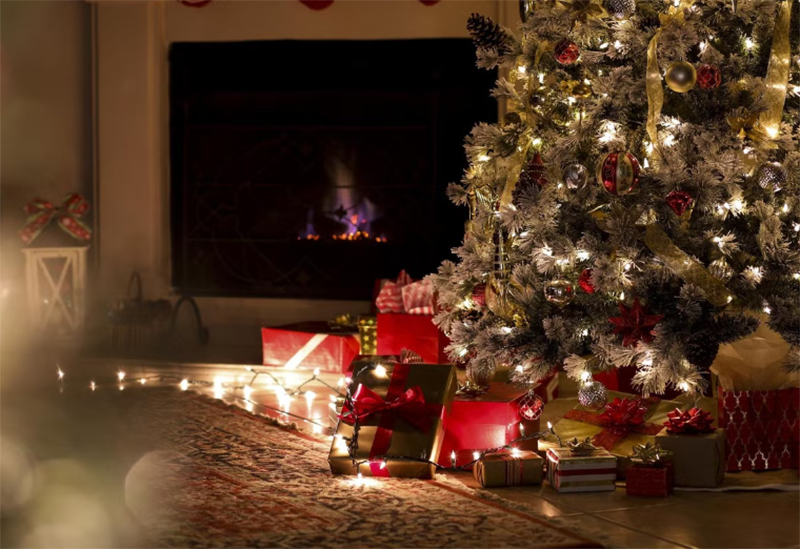The holidays are one of the most magical times of the year, but they are also one of the most hazardous for fires, and Christmas lights present a significant danger inside and outside the home and workplace.
Leaving Christmas lights on all day and night is both a fire risk and costly. How much energy you consume will depend on the wattage and duration of your lights, the Christmas light manufacturer and the power cost per unit of electricity from your specific energy provider. Find and compare providers to manage your business electricity supply and understand what you are paying for.
There is no reason to become less concerned about your business fire safety procedures during the festive season. Fire safety should be ensured with greater consideration for fire hazards and a better understanding of prevention methods. Here are a few safety tips to prevent fires and electrical accidents caused by Christmas lights.

Never Leave Christmas Lights Unattended
Turn your Christmas lights off whenever you aren’t nearby to monitor them, whether dashing out for last-minute gifts or turning in for the night. The good news is that various products are available that make this task easier, including Christmas light timers and remote controls that turn your lights off directly from your phone.
Replace Incandescent Lights With Energy-efficient LED Lights
Despite being more expensive, LED lights are safer, produce less heat, and are more energy-efficient. Christmas lights designed for modern usage have fused plugs that prevent sparks during a short circuit, and you can safely dispose of your old lights with them.
Missing or Broken Bulbs Should Be Replaced
Before you string your outdoor or indoor lights up, ensure all bulbs are in good working order so that you do not risk electrocution, fires, or avoidable injuries. Most home improvement stores sell replacement bulbs, although most lights come with them when you first purchase them.
Dispose of Old or Broken Xmas Lights Safely
Christmas lights shouldn’t be thrown in the trash. You are doing a disservice to the environment and can cause a safety hazard by throwing broken bulbs into trash bags. Recycling Centres accept
Christmas and fairy lights, categorized as small electrical items.
Some charities collect used fairy lights for recycling after Christmas as part of their charity drives. Christmas lights of any type will be accepted, so don’t worry whether yours are incandescent or LED.
Keep Indoor Lights on the Inside and Outdoor Lights on the Outside
You should never use indoor or outdoor lights interchangeably, even though they look similar. The lights used indoors for tree decorating are meticulously tested to ensure they don’t pose a fire hazard, and the outdoor lights are designed and tested to withstand cold and rainy weather.
Christmas lights designed for indoor use have less insulation to protect them from damage caused by sunlight, harsh weather, or general wear and tear. On the other hand, outdoor lights may pose a fire hazard if strung on the family tree because they are often hotter, whereas indoor lights probably would not survive a severe winter storm. To avoid confusion, keep your indoor and outdoor lights separate and label them.
Avoid Electrical Christmas Lights on Metallic Trees
Metallic Christmas trees can add a touch of sparkle to your holiday décor, but be careful not to use electric lights or decorations when you choose a metallic tree. In the event that the tree becomes charged with electricity, anyone who comes in contact with it could suffer a shocking experience.
Keeping Your Christmas Tree Fire-safe
The most common cause of house fires during the holidays is Christmas trees. Artificial trees are a safer alternative to real trees, and fire-resistant materials make artificial trees relatively safe to decorate and light. Natural trees should be kept well watered, and they should be fresh when you buy them. Trees that have dried out should be removed from the home as soon as possible.
Final Thoughts
Decorative lighting plays an essential role in holiday celebrations, but it causes numerous fires and property damage every year. You can avoid holiday dangers by following the safety tips listed above.
Additionally, ensure your smoke alarms are functioning correctly, and get a fire extinguisher for every level of your house if you don’t have one. Make sure the pressure gauge is still functional, and check the label for an expiration date. When an emergency arises, ensure everyone knows how to use a fire extinguisher.
